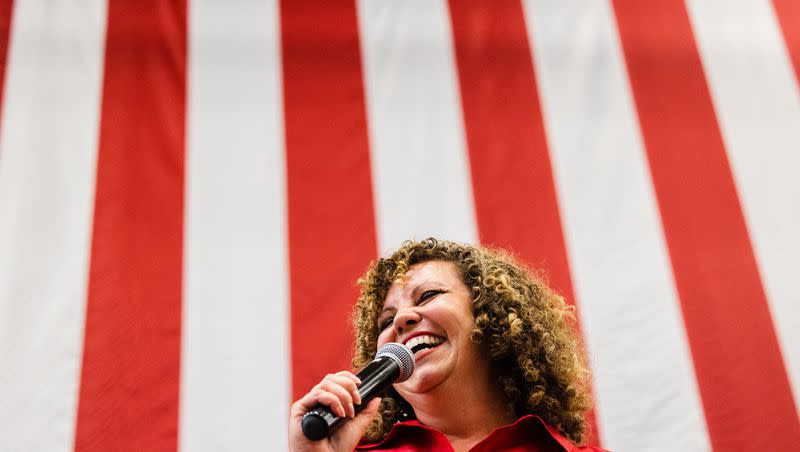Opinion: Making sense of the 2nd District special election race in Utah

- Oops!Something went wrong.Please try again later.
The 2nd Congressional District contest is a sugar high for political junkies, especially in a hot summer off-year election. Here are some additional bonbons to chew on.
A majority of delegates at the June 28 Republican convention selected Celeste Maloy as their nominee. But politicos are still reeling from allegations that she did not satisfy all the technical requirements. Her name was officially submitted by the party, so she will be on the ballot, but that has not eliminated the controversy. Will this be an issue in the Sept. 5 primary election or will voters care about other matters when selecting the Republican nominee?
Pignanelli: “The technicalities matter a lot, but the unifying vision matters more.” — Ted Nelson
Many officials, especially lawmakers, are miffed about this issue. All GOP candidates for federal, state and local partisan offices are bound by the same state law — they must be a member of the party when filing for office. Technically, Maloy was not a registered voter with a statement of party affiliation when she submitted her declaration. Thus, the frustration.
However, Maloy’s GOP bona fides are impeccable, with endorsements from Congressmen Chris Stewart and Rob Bishop, along with others. Claims she is some outsider manipulating the system will be difficult.
This controversy is “insider baseball” that will be diffused by the primary election. But legislators may seek statutory clarity next session.
Webb: With both the Republican Party and the state elections office certifying Maloy for the ballot, it’s highly unlikely she will be removed. Legislative action clarifying eligibility statutes would make sense.
Related
Celeste Maloy wins Utah Republican convention, advances in effort to replace Rep. Chris Stewart
GOP special primary election almost certain as Edwards submits 7,000 signatures
Maloy’s convention win against better-known Republicans was a surprise, but she demonstrated some real political acumen by winning in the crowded field. She has excellent experience as a top congressional staffer, but running for office is a much different endeavor. She navigated it well.
While I don’t take issue with Maloy’s victory, I have a lot of respect for former Utah House Speaker Greg Hughes and I hope he will continue to seek office. He’s a fighter for conservative principles, but he’s also compassionate and sensible.
As of the deadline for this column, Becky Edwards was certified to be on the primary ballot with predictions Bruce Hough would succeed in providing enough signatures. What are the political types saying about the dynamics of this race?
Pignanelli: Convention results are poor indicators of primary election results, so all contenders have a chance. Yet, Maloy has momentum among delegates. Over half of voters in the 2022 congressional primary resided south of Tooele County — a significant advantage for Maloy.
Former lawmaker Edwards (daughter-in-law of beloved BYU coach LaVell Edwards) commands a strong following among moderate factions within the party and name identification from her candidacy in the recent U.S. Senate primary.
Most Utah politicos know the gregarious Bruce Hough, a longtime party official and activist who enjoys much institutional support. Hough’s reputation is further enhanced by his family’s famous participation in the “Dancing with the Stars” television program.
The GOP primary aspirants have distinctive, but not overwhelming, advantages and disadvantages. Consequently, success depends upon the basics of retail politics — clever messaging and effective “Get Out The Vote” measures.
Webb: I don’t know Maloy, but I believe any of the three would represent Utah well in the U.S. Congress. Becky Edwards is a traditional conservative with excellent experience and credentials. She’s not going to be a zealous right-wing partisan, but she fits the mainstream of Republican voters just fine.
Bruce Hough is a terrific candidate who built a large, successful business and has been involved at the top levels of the Republican Party for decades. He knows how to get things done in politics and is smart and hard-charging. He is a sensible conservative.
Edwards and Hough will likely be able to raise substantial money to run strong primary election campaigns. All three candidates will be good debaters, will know the issues, and will communicate well. It’s going to be an intense month-and-a-half as all three campaigns get rolling.
Related
The Democrats overwhelmingly approved Sen. Kathleen Riebe be to be their nominee. The United Utah Party chose January Walker. The Libertarian and Constitution parties will also have candidates for the Nov. 21 general election. What can readers expect from their campaigns?
Pignanelli: Stewart secured 60% in the 2022 election, which favors the ultimate Republican nominee. Thus, shrewd candidates must develop creative messaging that utilizes the unique dynamics of this special election.
Webb: The Republican nominee will be highly favored. It will be hard for the Democrats to label any of the three Republicans as right-wing wackos. They’re all mainstream Republicans and reflect the views of most Utah voters.
Republican LaVarr Webb is a former journalist and a semiretired small farmer and political consultant. Email: lwebb@exoro.com. Frank Pignanelli is a Salt Lake attorney, lobbyist and political adviser who served as a Democrat in the Utah state Legislature. Email: frankp@xmission.com.

